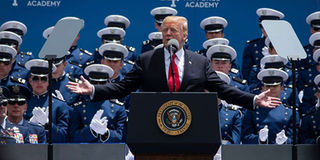Trump beating the war drums for Iran in a highly familiar fashion

US President Donald Trump addresses the 2019 graduation ceremony at the United States Air Force Academy in Colorado Springs, Colorado, on May 30, 2019. He is bringing Iran's economy to a standstill. PHOTO | CHET STRANGE | AFP
What you need to know:
- Obama led the US, France, UK, Germany, China, Russia, Iran and the 28-member EU in negotiating a deal that would keep Tehran's nuclear programme in the peaceful orbit.
- Mr Trump accused Iran’s elite military corps of actively participating in, financing and promoting “terrorism as a tool of statecraft”.
There is a familiar ring of suspicion to the fast escalating tension in the Persian Gulf and Middle East pitting the United States and its regional allies on the one hand and Iran and its proxies on the other.
In its military interventions in the region, Washington has always first got its culprit, conviction and sentence and then began to look for the evidence. Is it bucking this trend this time around?
Early last month, Washington suddenly warned that its intelligence pointed to heightened activity that would culminate in attacks on US allies or their assets or on the US’s assets in the region.
Who by? Iran, or its proxies in Syria, Iraq, Lebanon, Yemen or Afghanistan. The evidence was not given.
But National Security Adviser John Bolton said last week that it is “almost certain” it was “Iranian naval mines” that damaged two ships belonging to Saudi Arabia, one to the United Arab Emirates (UAE) and another Norwegian flagged on May 12.
Where? In UAE territorial waters. Mr Bolton added that two days later, Iranian-backed forces launched drone attacks on Saudi oil-pumping facilities.
ATTACK
And, he said, the same forces fired a rocket into the Iraqi capital Baghdad, targeting the American mission.
He promised to give evidence to the UN this week. However before Mr Bolton spoke, and prior to the attacks on the ships, an American aircraft carrier and battleship group had last month steamed into the region.
They were joined by the giant B 52 strategic bombers that flew into equally American military bases in the region.
Then Washington revealed it was considering deploying 200,000 troops in the Gulf as it let it be known that it would hold Tehran responsible for any attacks on its assets, or on its allies, or on their assets, or both.
Put another way, Washington has Tehran in its crosshairs and was shopping for an excuse to pull the trigger.
And, such intense rhetorical and military pressure could result in Tehran or one of its proxies making a mistake, on which Washington would capitalise to attack.
NUCLEAR
But still, why? Historically, Washington has intervened in the region principally for the security and protection of Israel; of its oil-producing allies led by Saudi Arabia; of the region’s oil production and transit infrastructure, and of maritime trade routes.
Iran however cannot win a war against Israel. Indeed, Arab nations cannot defeat Israel.
It has by far the superior military and intelligence. Above all, Israel is nuclear-armed. Iran cannot win a war against its Arab neighbours either. It has no nukes, nor is it a threat to America.
Why fight it? The West have since the 90s played up Iran’s nuclear development programme.
Time without number, they have branded it dangerous and aimed at destroying Israel and the West.
So, in 2015 President Barack Obama led the US, France, UK, Germany, China, Russia, Iran and the 28-member European Union in negotiating a deal that would keep Tehran's nuclear programme in the peaceful orbit.
SANCTIONS
In return sanctions against Tehran were removed and, crucially, Iran was brought back into the global financial system.
But candidate Donald Trump famously denounced it as rotten and, as President, withdrew America from it a year ago last month.
He instead imposed a new and austere sanctions regime aimed at killing off Iran’s export of oil altogether, isolating it financially and bringing its economy to a standstill.
Then, on May 12, 2018, Secretary of State Mike Pompeo issued a 12-point ultimatum to Tehran.
It’s dos and don’ts would make sense only if Iran had just lost a war it started or forced on the US and or its allies.
But Mr Trump’s tough action and Mr Pompeo’s tougher demand pale in comparison to the President’s unprecedented April 8 action: he officially declared Iran’s elite military corps, the Republican Guard, a terrorist organisation.
SINKING ECONOMY
Mr Trump accused the Guard of actively participating in, financing and promoting “terrorism as a tool of statecraft”.
But the President said last week he does not seek regime change in Iran, but only wants to ensure Tehran does not acquire nukes.
Mr Trump’s rhetoric and actions don’t tally. His sanctions have isolated Iran from the global financial system and reduced its oil production from 1.3 million barrels a day to just 400,000 and dropping.
Clearly, Washington wants Tehran to capitulate or for Iranians to rebel. Meanwhile, wait for Mr Bolton’s UN evidence. Remember Colin Powell?





